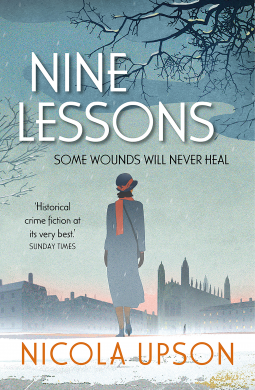I've long loved Josephine Tey's novels and in more recent years I've also loved Nicola Upson's "Josephine Tey" series in which a fictionalised version of the writer is the main character.
It's an interesting and I feel somewhat audacious premise, given that the stories concern not just the investigation of crimes but also Josephine's personal and romantic life. Of course the real life Josephine wasn't Josephine at all; Josephine Tey was a pen name for Inverness-born Elizabeth Mackintosh. Nicola Upson's character however is clearly Josephine, not Elizabeth, and hence already a step removed from the real person, although she shares many biographical details, including her former career as a physical training instructor and her success as a playwright.
The latest instalment, set in 1937, finds Josephine staying in her lover Marta's new house in Cambridge while Marta is away in America. Josephine's dear friend, Detective Chief Inspector Archie Penrose, is investigating an apparently linked series of unpleasant murders with a Cambridge connection; meanwhile, a serial rapist is terrorising the women of Cambridge.
This was a really excellent read, tightly plotted and with a genuinely surprising resolution which I certainly did not predict. There's an intriguing literary connection, too, via the acclaimed ghost story writer, scholar and former provost of King's College, Cambridge, M. R. James. He doesn't appear directly, having died in 1936, but nevertheless has a role to play.
As ever this is beautifully and intelligently written and evokes a genuine sense of place and time, both socially and politically. The shadow of the First World War still lingers, the second is not yet a reality, although there is a subtle sense of tensions growing in Europe; but the Duke and Duchess of Windsor can still be photographed taking tea with Hitler. (I looked up the picture in question; it's quite something.)
The rape storyline is sensitively handled and there is no glossing over either the lasting damage done or the attitude of many - the police included - who regard it as not, in itself, really that significant a crime.
There were a couple of phrases which jarred slightly: I'm not sure if people in the 1930s (even Marta) would have used the term "for fuck's sake". But maybe they would; I'm no expert on the matter.
The title had me puzzled for a while. But ultimately it makes perfect sense. And I do love the covers of these books.
Highly recommended.
Polite request: I'd love to read a future novel set in Josephine's native Inverness!

No comments:
Post a Comment